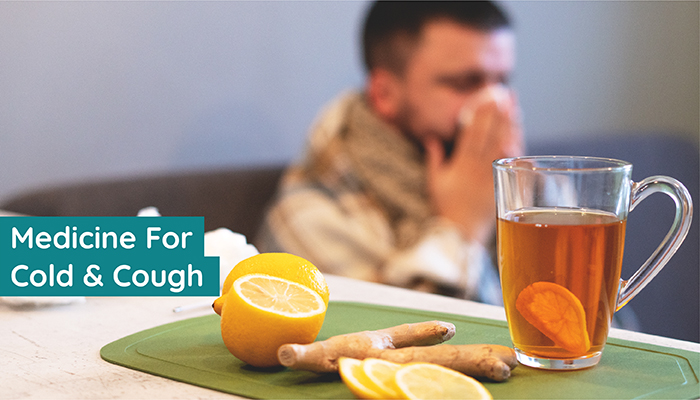Cold & cough are generally associated with the common cold. It can be caused by more than 200 viruses, the most common one being the rhinovirus, and can easily spread to others. It takes 3 to 4 days for a viral infection to reach its peak, and then, you experience symptoms like nasal congestion, runny nose, or wet coughs.
Although cold and cough are usually harmless, they lead to more visits to a doctor and absence from school or work than any other illness. Young children and infants may have cold & cough more frequently than adults (2 to 3 times a year). People who smoke may have a slow recovery rate than non-smokers, who may require 7 to 10 days to get completely well.
Most of the times people can self-diagnose the condition, and some rest helps in the recovery. Read on to find some things you should know about the disease to prevent getting affected in the future or spreading the virus to others.
Symptoms of Cold & Cough
The symptoms of the common cold usually don’t appear suddenly; you may not know you have a cold-causing viral infection until after the symptoms have progressed, that is, 1 to 3 days after contracting the disease. Common cold symptoms can affect the upper respiratory tract (nose and throat), head, and even the whole body in some cases. Following are some of the common symptoms of cold and cough:
1. Nasal congestion
2. Stuffy or runny nose
3. Sneezing
4. Sinus pressure
5. Postnasal drip or drainage of mucus in the back of your throat
6. Watery eyes
7. Sore throat cough
Causes Of Cold & Cough
Cold and cough are caused by any one of the viruses that cause inflammation of the respiratory tract membranes. As mentioned above, rhinovirus is the most common cause of
cough and cold. These viruses can spread from person to person and may be transmitted through different surfaces touched by an infected person. They can lay dormant for hours and days on the surface and become active again inside your body. A virus is likely to spread and cause severe cold and cough if there is low humidity, which leads to dry nasal passages becoming highly susceptible to an infection.
Apart from the common cold, you can have running nose and cough due to allergies caused by various factors such as dust, pollen, and pollution. Another cause is the influenza virus that causes the flu; it also affects the respiratory tract and causes cold and cough along with
fever and body ache. Although people believe that cold weather is one of the most common causes of cold and cough, it is untrue.
Diagnosis of Cold & Cough
Under normal circumstances you can diagnose it on your own by looking at the symptoms. That being said, if your symptoms don’t appear to be improving at all after 5 to 6 days or seem to be getting worse, chances are you do not have a common cold. You should visit the doctor under such circumstances.
Your body fights the viral infection on its own and in about 7 to 10 days, you will feel completely alright.
If you only have the common cold, then you only need to take medication for your symptoms if they are hindering your day-to-day functions. Over-the-counter (OTC)
medicines for cold and cough, resting, and staying hydrated are usually enough to tackle severe symptoms.
As for allergies, your doctor will be able to diagnose the condition more accurately. However, you’ll notice your symptoms getting worse every time you go for a walk, for example, or normal medication for cold and cough don’t work for you if your symptoms are due to an allergy.
Treatment of Cold & Cough
The body cures the condition of cold and cough on its own, but people take measures to control or reduce the symptoms since it can be quite troublesome. People generally prefer getting some OTC medications to relieve symptoms of the condition:
1. Decongestants to help with the nasal congestion and stuffiness
2. Antihistamines to prevent excessive sneezing and ease runny nose
3. Pain relievers to ease body aches and headaches
It is important to note that cold and cough are caused by viral infections; thus, antibacterial medicines will not work. Additionally, you should never administer OTC medicines such as cough syrups to children under the age of 4 years without consulting a paediatrician since they can have severe side effects.
Some people avoid taking any medicine; they can opt for any of the home remedies mentioned here:
1. Gargling with warm salt-water
2. Inhaling steam
3. Drinking plenty of fluids
4. Drinking ginger tea or warm water
5. Getting enough rest
Risk Factors of Cold & Cough
Following factors increase the risk of you having cold and cough:
1. Seasonal changes during autumn, winter, or the rainy season increase the likelihood of viral infections and compel us to spend more time indoors. However, you can have cold and cough any time of the year.
2. A large gathering of people, such as during school sessions and weddings, increases the risk of infection.
3. Children under the age of six years are more likely to develop cold and cough, especially if they are in child-care facilities with other children.
4. Low immunity, due to a chronic illness or lack of sleep, is also one of the most common reasons due to which people catch cold and cough.
5. Smokers have a high risk of the common cold with more severe symptoms in comparison to non-smokers.
Preventive Measures of Cold & Cough
Although there is no vaccine against common cold and cough, you can take the following measures to avoid getting it:
1. Maintain some distance from the infected person, or stay at home/away from people if you have the cold and cough.
2. Ensure that you get proper sleep so that your immune system is not compromised.
3. Take care of your gut bacteria and boost your overall health by eating food items like yogurt or take probiotics daily.
4. Wash your hands properly with soap and water every now and then, especially if you are in a public place.
5. Avoid touching your face; you may have dormant viruses on your body/hands, which can become active once they enter your system through your nose or mouth.
6. Cough or sneeze into your elbow to minimise the spread of the virus.
When to See a Doctor?
In most cases, you won’t need to visit a doctor even if you feel wretched due to the symptoms. Most viral infections will be over in 7–10 days, hitting the peak on day 4 or 5. Simply using the home remedies mentioned above or taking OTC medicines can be adequate to alleviate the symptoms.
However, you should visit the doctor if any of the following instances occur:
1. Severe symptoms that seem to be getting worse with time even after trying general treatment methods
2. Symptoms lasting more than 10 days
3. Infants or new-borns with cold and cough should be taken to the doctor visit as their immune system is relatively weak
4. If you have difficulty breathing you should not ignore it and get medical attention
5. Persistent or high fever (greater than 101.3 °F for adults and 100.4 °F for children) can be caused due to a different underlying condition or a severe infection and requires medical attention


